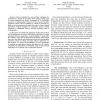Free Online Productivity Tools
i2Speak
i2Symbol
i2OCR
iTex2Img
iWeb2Print
iWeb2Shot
i2Type
iPdf2Split
iPdf2Merge
i2Bopomofo
i2Arabic
i2Style
i2Image
i2PDF
iLatex2Rtf
Sci2ools
115
click to vote
CSFW
2009
IEEE
2009
IEEE
A Method for Proving Observational Equivalence
—Formal methods have proved their usefulness for analyzing the security of protocols. Most existing results focus on trace properties like secrecy (expressed as a reachability property) or authentication. There are however several security properties, which cannot be defined (or cannot be naturally defined) as trace properties and require the notion of observational equivalence. Typical examples are anonymity, privacy related properties or statements closer to security properties used in cryptography. In this paper, we consider the applied pi calculus and we show that for determinate processes, observational equivalence actually coincides with trace equivalence, a notion simpler to reason with. We exhibit a large class of determinate processes, called simple processes, that capture most existing protocols and cryptographic primitives. Then, for simple processes without replication nor else branch, we reduce the decidability of trace equivalence to deciding an equivalence relation i...
Related Content
| Added | 20 May 2010 |
| Updated | 20 May 2010 |
| Type | Conference |
| Year | 2009 |
| Where | CSFW |
| Authors | Véronique Cortier, Stéphanie Delaune |
Comments (0)

